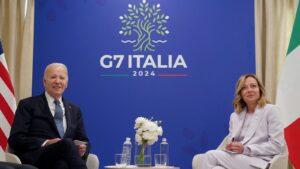ButSpeak.com
News which Matters.

At the recent G7 summit in Italy, leaders grappled with several critical issues, including ongoing conflicts in Gaza and Ukraine, financial support for Ukraine, and a contentious debate over abortion rights. The final communiqué, a document summarizing the leaders’ agreements, became a focal point of diplomatic tension, primarily between the United States and Italy.
The dispute arose when Italian Prime Minister Giorgia Meloni requested the omission of the terms “abortion” and “reproductive rights” from the communiqué. Despite assurances from the Italian government that there was no intent to undermine access to safe abortions, this move was met with resistance from President Joe Biden and other G7 leaders.
President Biden, a Catholic who has become a staunch defender of abortion rights following the Supreme Court’s 2022 decision to overturn Roe v. Wade, pushed for explicit language supporting reproductive rights. Several G7 members sided with Biden, advocating for a reaffirmation of commitments made in the previous year’s Hiroshima communiqué, which addressed access to safe and legal abortions.
Ultimately, the word “abortion” was omitted from the communiqué. However, the document did reference the previous year’s commitments, stating, “We reiterate our commitments in the Hiroshima Leaders’ Communiqué to universal access to adequate, affordable and quality health services for women, including comprehensive sexual and reproductive health and rights for all.” The Hiroshima statement had specifically mentioned safe and legal abortion.
For Prime Minister Meloni, taking a conservative stance on abortion aligns with her domestic political base and possibly with Pope Francis, who was present at the summit to discuss artificial intelligence. Meloni’s conservative policies at home have been balanced with a pro-Western approach to international affairs, particularly regarding support for Ukraine.
President Biden, facing a re-election campaign, has used the defense of abortion rights to galvanize key voting blocs. His insistence on including reproductive rights in the communiqué underscores his commitment to this issue.
The debate at the G7 summit highlights the complex interplay between domestic politics and international diplomacy. While the compromise language satisfied the need for consensus among the G7 leaders, it also reflected the divergent views on reproductive rights among the member nations.
As the summit concluded, reactions were mixed. French President Emmanuel Macron expressed regret over the omission of direct language supporting abortion rights, while Italian lawmaker Laura Boldrini criticized the compromise as a setback for Italy. Conversely, anti-abortion activists in Italy praised Meloni for considering her conservative base.
The G7 summit in Italy not only addressed pressing global issues but also spotlighted the enduring and contentious debate over reproductive rights. The diplomatic tug of war over the final communiqué underscores the complexity of balancing national interests with international consensus.
The outcome of this debate, while a compromise, indicates the ongoing struggle over abortion rights on the global stage. As leaders navigate these issues, the balance between domestic policies and international agreements will continue to shape the discourse on reproductive health.